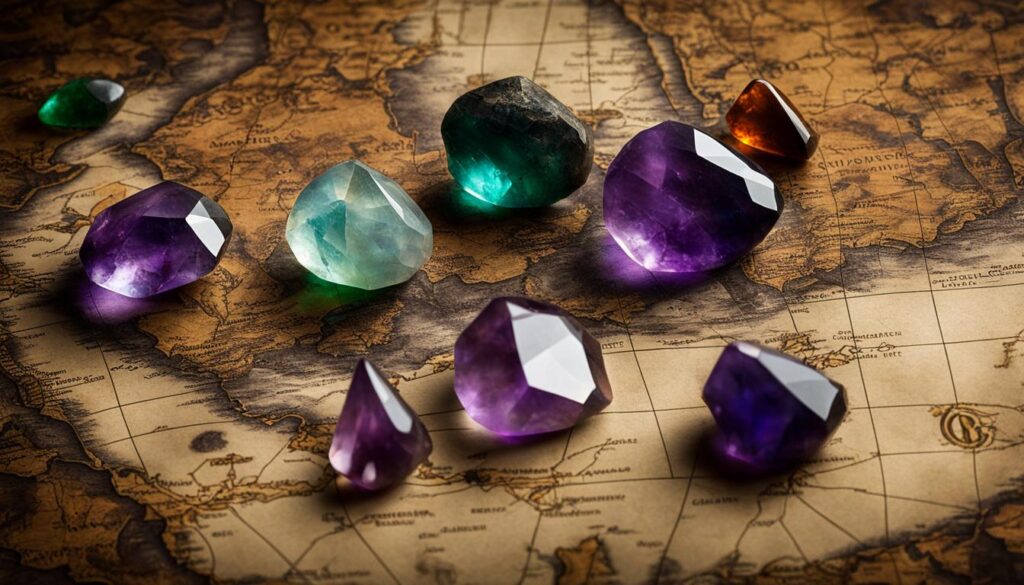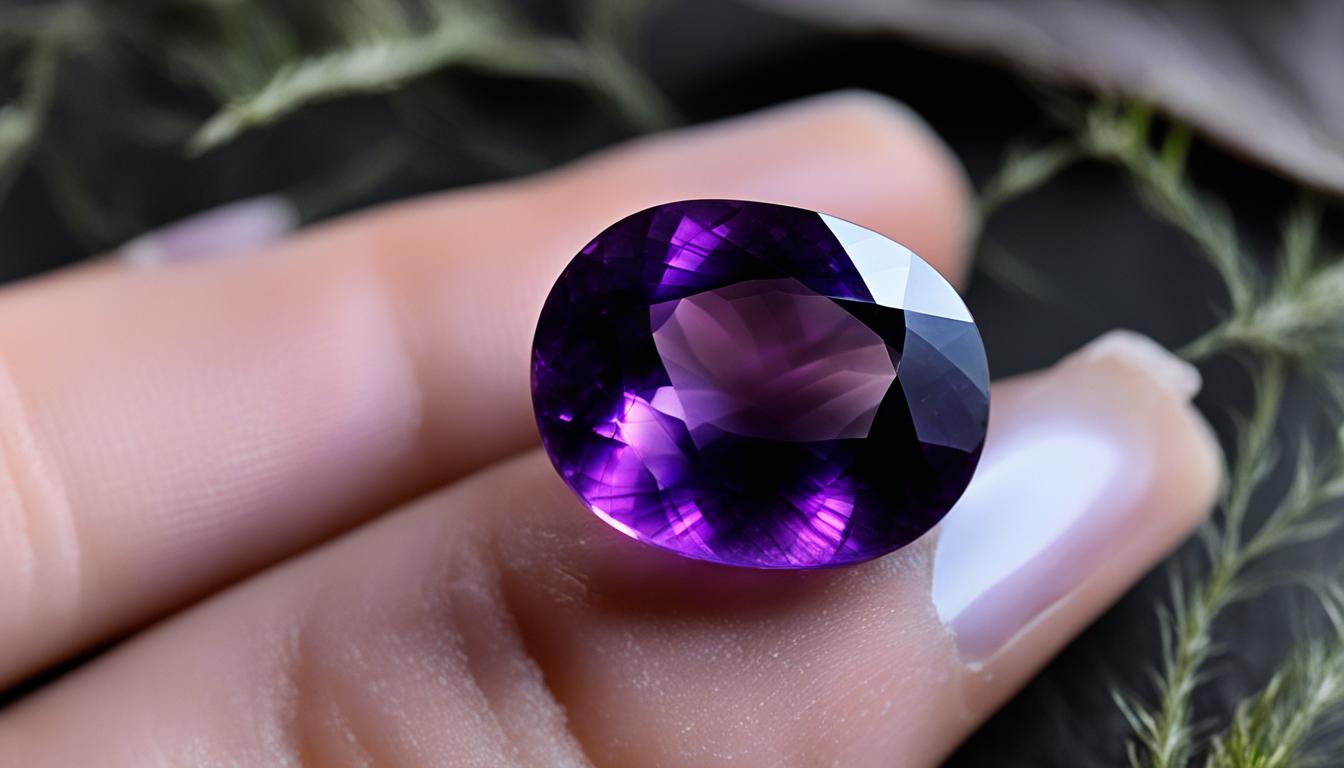Gemstones have long been cherished for their beauty and perceived mystical properties. However, certain gemstones, including amethyst, have garnered a reputation for bringing bad luck. Superstitions and myths have led to concerns about the supposed negative effects of amethyst. In this article, we will delve into the truth behind these beliefs and debunk the myth surrounding amethyst and bad luck.
Amethyst, a striking purple quartz, is highly regarded for its calming and spiritual properties. It has been used for centuries for its ability to promote mental clarity, stress relief, and spiritual growth. Despite its positive attributes, some individuals have expressed concerns about wearing or owning amethyst due to superstitions and folklore.
However, it is essential to remember that gemstone myths and superstitions are based on subjective beliefs rather than scientific evidence. There is no concrete evidence to suggest that amethyst brings bad luck. In fact, amethyst is associated with numerous positive attributes, such as enhancing intuition, promoting creativity, and fostering a deep sense of peace.
Furthermore, gemstones, including amethyst, are believed to have unique energies that can be influenced by the intentions and beliefs of the individual. If one believes that amethyst brings bad luck, it may manifest as such in their experience. However, for many others, amethyst holds only positive and healing qualities.
Ultimately, the power of gemstones lies in our interpretation and personal relationship with them. It is important to approach gemstone beliefs with skepticism, keeping in mind that they are rooted in folklore and individual experiences. By understanding the true nature of gemstones and practicing regular cleansing and intention-setting, we can enjoy their beauty and potential benefits without fear of negative outcomes.
Key Takeaways:
- Amethyst has a long-standing reputation for its calming and spiritual properties.
- Superstitions surrounding amethyst and bad luck are not based on scientific evidence.
- Gemstone beliefs and experiences vary among individuals.
- Approach gemstone myths with skepticism and focus on personal intentions and beliefs.
- Regular cleansing and intention-setting can help maximize the positive energies of gemstones.
The Meaning, Properties, and Powers of Amethyst
Amethyst, a member of the quartz family, holds a special meaning and significance. Its name is derived from the Greek word “amethystos,” meaning “not intoxicated,” as the stone was believed to protect against drunkenness. In ancient Greece, it was also associated with wealth and power. With its beautiful violet color, amethyst is often used in jewelry and as decorative pieces.
Amethyst possesses a deep spiritual significance and is highly regarded by healers and spiritualists. For centuries, it has been believed to provide protection, clarity, and promote spiritual awareness. The crystal is known to soothe stress and sadness and enhance focus. It is associated with the crown chakra and widely used in meditation practices.
Moreover, amethyst is believed to have physical healing properties. It is said to strengthen the immune system, cleanse the body, reduce pain, and aid in weight loss. This versatile gemstone offers a range of benefits for both the mind and body.
Amethyst Superstitions and Myths
“Amethyst does not have any widespread negative beliefs or associations.”
| Amethyst Symbolism | Amethyst Beliefs |
|---|---|
| Protection | Amethyst is believed to provide protection against negative energies and psychic attacks. |
| Spiritual Awareness | Amethyst is associated with enhancing one’s spiritual awareness and connecting with higher realms. |
| Clarity | Amethyst is said to bring mental clarity, aiding in decision-making and problem-solving. |
| Stress Relief | Amethyst is known to soothe stress, anxiety, and sadness, promoting a sense of calm. |
| Focus | Amethyst enhances focus and concentration, facilitating meditation and spiritual practices. |
Gemstone Superstitions and Beliefs Across Ancient Civilizations
Gemstones have played a significant role in ancient civilizations, including Egypt and Greece. These societies adorned themselves with gemstones not only for their beauty but also for their symbolic and protective meanings.
In ancient Egypt, different colors of gemstones were believed to provide protection against evil and bring good luck. For instance, emeralds were associated with fertility, immortality, rejuvenation, and eternal spring. They were highly valued for their vibrant green color and their perceived ability to bring abundance and happiness.
Lapis Lazuli, on the other hand, held a special place in ancient Egyptian society. Its deep blue color was considered a symbol of royalty, spirituality, and inner wisdom. Lapis Lazuli was often used in jewelry and decorative items for Pharaohs and high-ranking officials.
Ancient Greece also had its own set of gemstone beliefs and superstitions. Amethyst, derived from the Greek word “amethystos,” meaning “not intoxicated,” was believed to protect against intoxication. Ancient Greeks wore amethyst jewelry and carved vessels from the stone, believing that it would safeguard them from the effects of excessive drinking.
Sapphires, with their mesmerizing blue hues, were seen as symbols of wisdom and purity in ancient Greece. They were associated with divine favor and were often worn by those seeking enlightenment and spiritual guidance.
Furthermore, gemstones in both ancient Egypt and Greece were believed to possess healing properties. Pearls, for example, were thought to cure madness, treat jaundice, and ward off snakes and insects. Ruby, with its vibrant red color, was believed to change its hue in response to the wearer’s health, serving as an indicator of potential issues.
These gemstone superstitions and beliefs varied across different cultures and traditions but were united by a common reverence for the power and symbolism of gemstones.

Gemstone Beliefs in Ancient Egypt and Greece
| Gemstone | Ancient Egypt | Ancient Greece |
|---|---|---|
| Emerald | Associated with fertility, immortality, rejuvenation, and eternal spring | |
| Lapis Lazuli | Symbolized royalty, spirituality, and inner wisdom | |
| Amethyst | Believed to protect against intoxication | |
| Sapphire | Seen as symbols of wisdom and purity | |
| Pearl | Thought to cure madness, treat jaundice, and ward off snakes and insects | |
| Ruby | Believed to change color based on the wearer’s health |
Debunking Gemstone Myths and Superstitions
While gemstone myths and superstitions have been passed down through generations and are still believed by some, it is important to approach them with skepticism and critical thinking. Many associations between gemstones and bad luck or curses are based on historical legends, personal experiences, or subjective beliefs.
In reality, gemstones, including Amethyst, do not inherently bring bad luck or curses. Their effects and properties vary based on individual experiences, energy cleansing, and intentions. It is essential to research and understand the properties and possible effects of gemstones before using them in healing or spiritual practices.
Regular cleansing and charging of gemstones can help maintain their positive energies and prevent any potential negative effects. Ultimately, the power of gemstones lies in the meanings and intentions we attach to them, and individual experiences may vary.
FAQ
Can amethyst bring bad luck?
No, amethyst does not bring bad luck. It is not associated with any widespread negative beliefs or superstitions.
What are the properties and powers of amethyst?
Amethyst is believed to provide protection, bring clarity, soothe stress and sadness, promote spiritual awareness, and enhance focus. It is associated with the crown chakra and is used in meditation practices. It is also believed to have physical healing properties, such as strengthening the immune system, cleansing the body, reducing pain, and aiding in weight loss.
Are there any negative effects or superstitions surrounding amethyst?
No, there are no widespread negative effects associated with amethyst. It is a highly regarded gemstone with positive spiritual and healing properties.
What are some ancient civilizations’ beliefs about gemstones?
In ancient Egypt, different gemstones were believed to provide protection against evil and bring good luck. In ancient Greece, gemstones held symbolic meanings. For example, amethyst was believed to protect against intoxication, while sapphires were seen as a symbol of wisdom and purity.
Are gemstone myths and superstitions based on facts?
Gemstone myths and superstitions are often based on historical legends, personal experiences, or subjective beliefs. They should be approached with skepticism and critical thinking.
How can I protect myself from potentially harmful gemstones?
To protect yourself, it is important to regularly cleanse gemstones and research their effects and possible dangers. Regular cleansing and charging of gemstones can help maintain their positive energies and prevent any potential negative effects.




